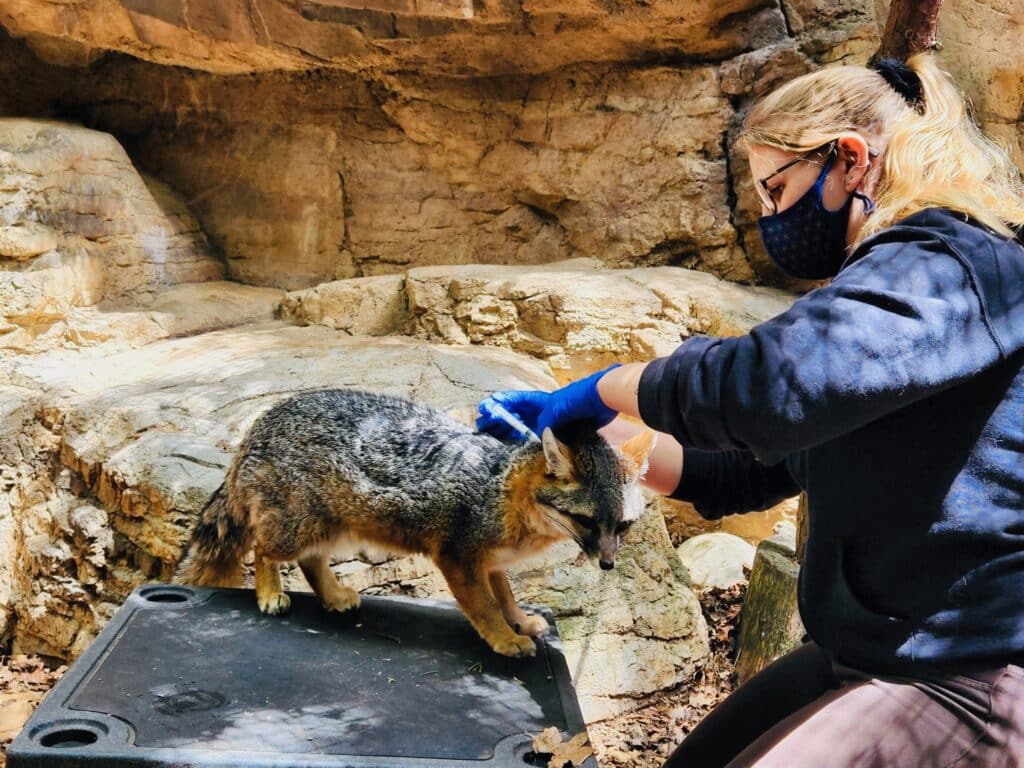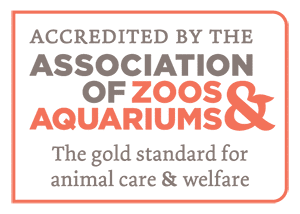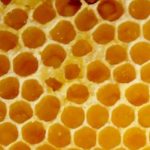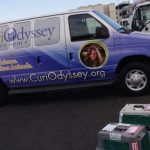Blog
CuriOdyssey’s Animals Get Vaccinated for COVID – 19
By: Dr. Kate Sulzner
CuriOdyssey is pleased to announce that several of our resident animals now have an added layer of protection against COVID-19. On May 5th, 2022, CuriOdyssey’s bobcats, grey fox, ferrets, and river otter all received their first in a series of two COVID-19 boosters. Our veterinary team focused on vaccinating these four animal species, in particular, given their increased susceptibility to the virus and their close interactions with the public. We are happy to report that all of the vaccinated animals are doing great and displayed no significant side effects to the vaccine.

After living through the Pandemic over the past two years, the public has learned quite a bit about this formidable virus. Along with other scientific lingo, COVID-19 brought the term, zoonosis, into mainstream conversations. A zoonosis is a disease that can be transmitted from animals to humans, or from humans to animals. COVID-19 is a vivid example of this. Currently, about 60% of emerging infectious diseases are zoonotic, and the majority of these are harbored in wildlife. However, wildlife is not the problem. The causes are complex and are tied to the breakdown of natural barriers between wild and urban spaces caused by the combined effects of environmental change, mass agriculture, biodiversity loss, and global travel. Together, these factors have placed humans, domestic animals, and wildlife in closer proximity than ever before, creating more opportunities for viruses and other infectious organisms to mutate and jump between species.
Although the exact origin of COVID-19 is still undetermined, all research points to the virus passing from animals to people through the wildlife trade supply chain. The rest of the story is history, with the virus quickly spreading among humans across the globe in early 2020. In the spring of that year, Zoetis, the company who produced the COVID-19 vaccine for zoos and wildlife facilities, recognized the critical need to protect naïve animals (those previously unexposed) from the virus after a series of outbreaks occurred on mink farms in the Netherlands. These incidents were followed by a number of zoo animals testing positive for the COVID-19, both in the U.S. and abroad. The species affected ranged from tigers and hippos to hyenas and gorillas. With some notable exceptions, most of the animals exhibited only mild to moderate symptoms and made a full recovery.
Still, with many zoos housing critically endangered species, the potential impacts of this virus have raised conservation concerns for both zoo animals and their wild counterparts. Since the beginning of the pandemic, the zoo community has relied on scientific research, evidence-based medicine, and information sharing to guide COVID-19 protocols for animals and staff members as part of a One Health approach.* The vaccine is a welcome addition to CuriOdyssey’s veterinary arsenal, and demonstrates the commitment of zoos like CuriOdyssey to optimize the health and welfare of the animals in our care, and contribute to efforts to maintain the health of wild populations. If there is any upside to the situation we’re currently in, it’s that the Pandemic has provided an opportunity for zoos to reinforce the connection between human, animal, and ecosystem health, and the necessity to restore a balanced coexistence between humans and nature.
*One Health is a collaborative approach that recognizes the interdependency of human, animal, and ecosystem health, and is critical to addressing the intersectional challenges of climate change, biodiversity loss, zoonotic pandemics, and social / racial inequities.
Join the CuriOdyssey Community
LOCATION
1651 Coyote Point Drive
San Mateo, CA 94401
Ohlone Land Acknowledgement
650-342-7755
info@curiodyssey.org
CuriOdyssey is a 501(c)(3) non-profit, Tax ID 94-1262434




